How economic concern may impact travel this year
While Americans will be reducing their spending on many key categories, more than 64% say they still plan to travel for leisure this summer according to a recent survey conducted by Hopper, with more than half planning to spend $1,000 or more.

Hayley Berg - Tue Jul 19 2022
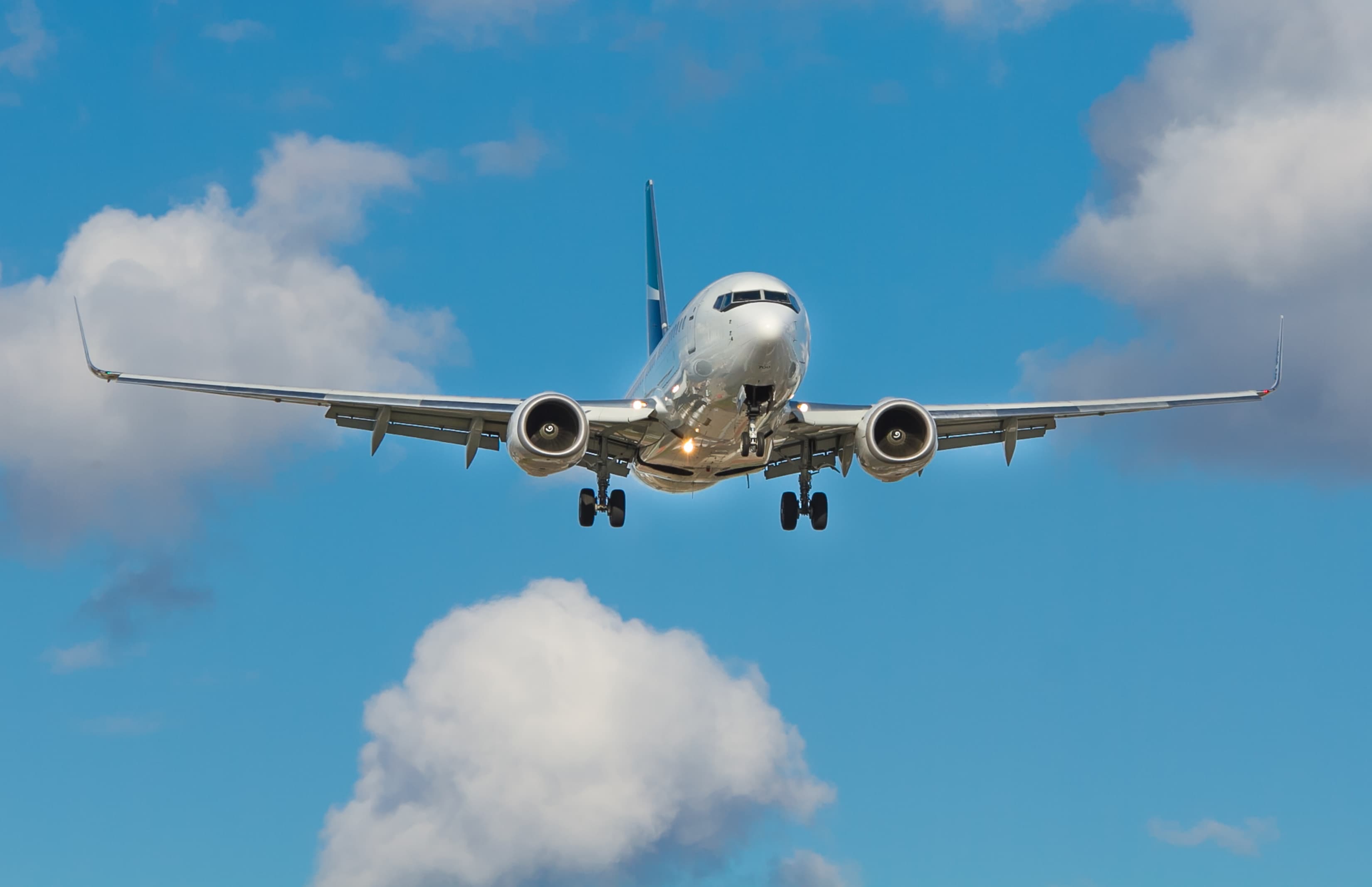
While Americans will be reducing their spending on many key categories, more than 64% say they still plan to travel for leisure this summer according to a recent survey conducted by Hopper, with more than half planning to spend $1,000 or more.
Current domestic round trip airfare will cost Americans $360 per ticket, an increase of 16% compared to 2019, but down 12% compared to the peak at over $410 per ticket in late May. Domestic airfares have already fallen $50 per ticket compared to May peaks, and travelers can expect continued relief for coming weeks.
Current international round trip airfare will cost Americans $1,042 per ticket, an increase of 26% compared to 2019, but down slightly from a peak in June. International airfare this year has closely matched 2018 levels and trends since mid spring, and we expect prices to continue to fall into the shoulder season, September and October.
Demand for air travel surged from February through a peak in mid June of this year, before beginning to flatten in line with seasonal expectations. In mid summer, demand seasonally falls off and flattens into the fall shoulder season, as most Americans schedule summer vacations and travel between May - July. Demand will pick back up seasonally in September as travelers begin to plan for holiday trips.
Though consumers plan to reduce their travel expenditure this summer, many consumers are still exhibiting travel planning and booking behaviors which became prevalent during the covid-19 pandemic, behaviors which could cost them more this summer.
With last week’s release of the June CPI, marking a 9.1% increase in all items, economic concerns continue to plague Americans and the economy. In a July survey by Hopper, nearly 60% of Americans claim they plan to reduce spending this summer, primarily cutting back on entertainment, dining out, major home or car purchases, transportation, and leisure travel. While Americans will be reducing their spending on many key categories, more than 64% surveyed still plan to travel for leisure this summer, with more than half planning to spend $1,000 or more. With higher airfare, hotel prices and surging prices at the pump, travelers will have to stretch their budget even further this summer.
Travel costs rising, but relief expected come fall
The cost of vacationing has risen this summer, with a weekend domestic trip averaging $752 for a round trip ticket and a two night hotel stay, nearly 25% more expensive than in 2019. For international travelers, a round trip ticket and a 5 night stay will average $1,335 total this year, an increase of 26% compared to 2019. Add on the potential cost of a rental car and fuel at over $5.00 per gallon, travel budgets are being squeezed from all directions this year.
Airfare: Current domestic round trip airfare will cost Americans $360 per ticket, an increase of 16% compared to 2019, but down 12% compared to the peak at over $410 per ticket in late May. Airfare falls seasonally after the mid-summer peak as demand for vacations slows, and will drop into September and October. Airfare has already fallen $50 per ticket compared to May peaks, and travelers can expect continued relief for coming weeks.
Current international round trip airfare will cost Americans $1,042 per ticket, an increase of 26% compared to 2019, but down slightly from a peak in June. International airfare this year has closely matched 2018 levels and trends since mid spring, and we expect prices to continue to fall into the shoulder season, September and October.
Airfare has risen rapidly this year due to the rapid resurgence of demand for travel, and due to significant increases in the cost of jet fuel. Fuel prices have dropped from peaks over $5/gallon, but remain over $3.40 per gallon, an increase of 88% compared to July of 2019. Jet fuel costs account for anywhere from 10% - 30% of an airline’s operating costs, meaning prices need to recover significantly before airfares will recover to near 2019 levels.
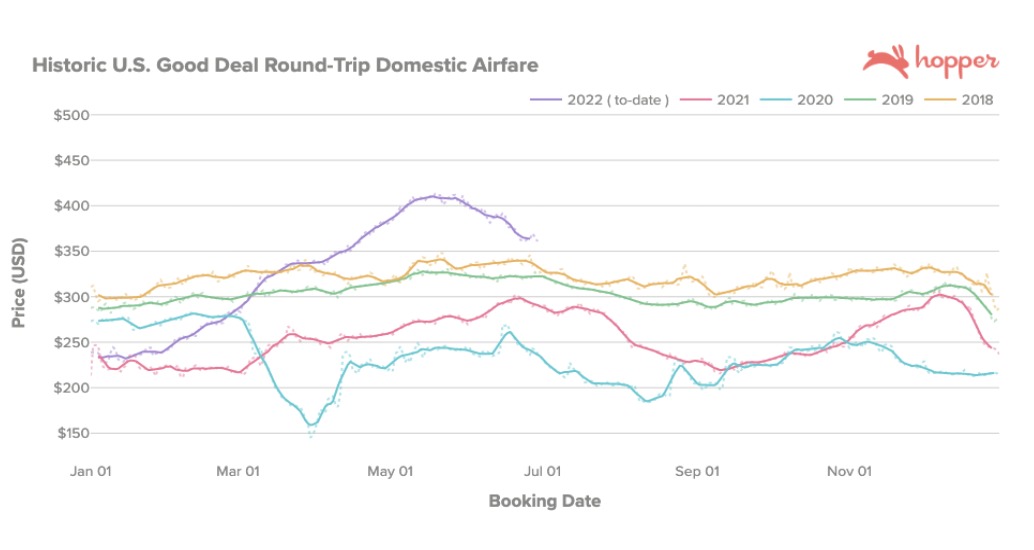
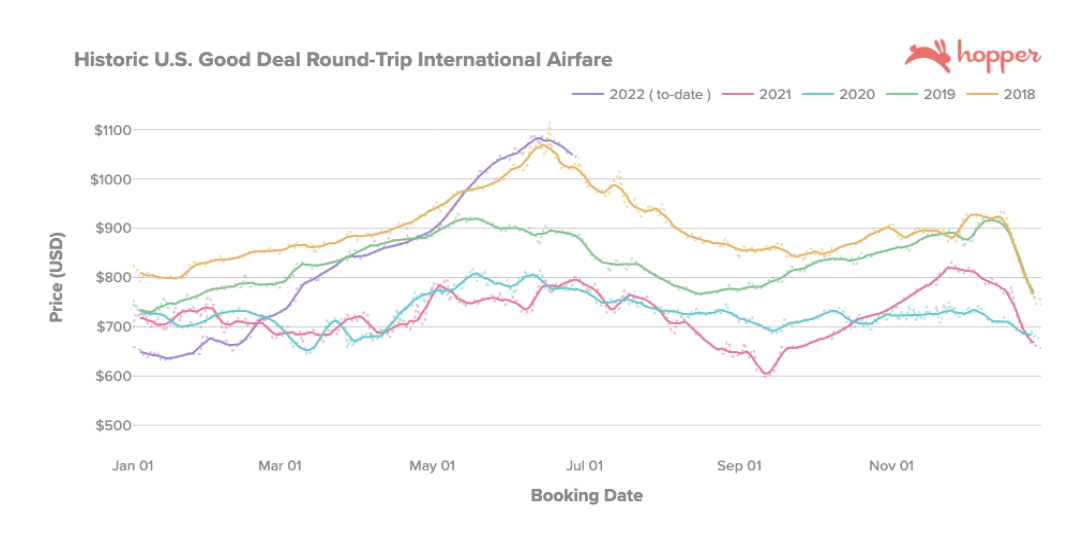
Hotels & Accommodations:
40% of travelers are planning to stay at a hotel during a trip this summer, and 14% more are taking advantage of the benefits of rental homes for vacation. Americans are currently paying an average nightly rate of $196 for a weekend hotel stay, an increase of 15% compared to 2019. Nightly hotel rates on weekends are up 29% compared to this time last year. We expect domestic nightly hotel rates to continue to rise throughout the remainder of the summer through September.
Internationally, the average nightly rate for a hotel is $146, an increase of 27% compared to 2019. As international travelers have returned and restrictions on travel have been lifted, up 34% from July of 2021.
Car Rentals
More than half (54%) of travelers plan to drive to or on their vacation this summer, despite gas prices peaking over $5.00 per gallon in most regions of the country this month. Prices have continued to surge, showing only slight relief for consumers in the most recent few days. Travelers on the West Coast are seeing the highest prices, with the average per gallon price peaking over $5.50 in late June.
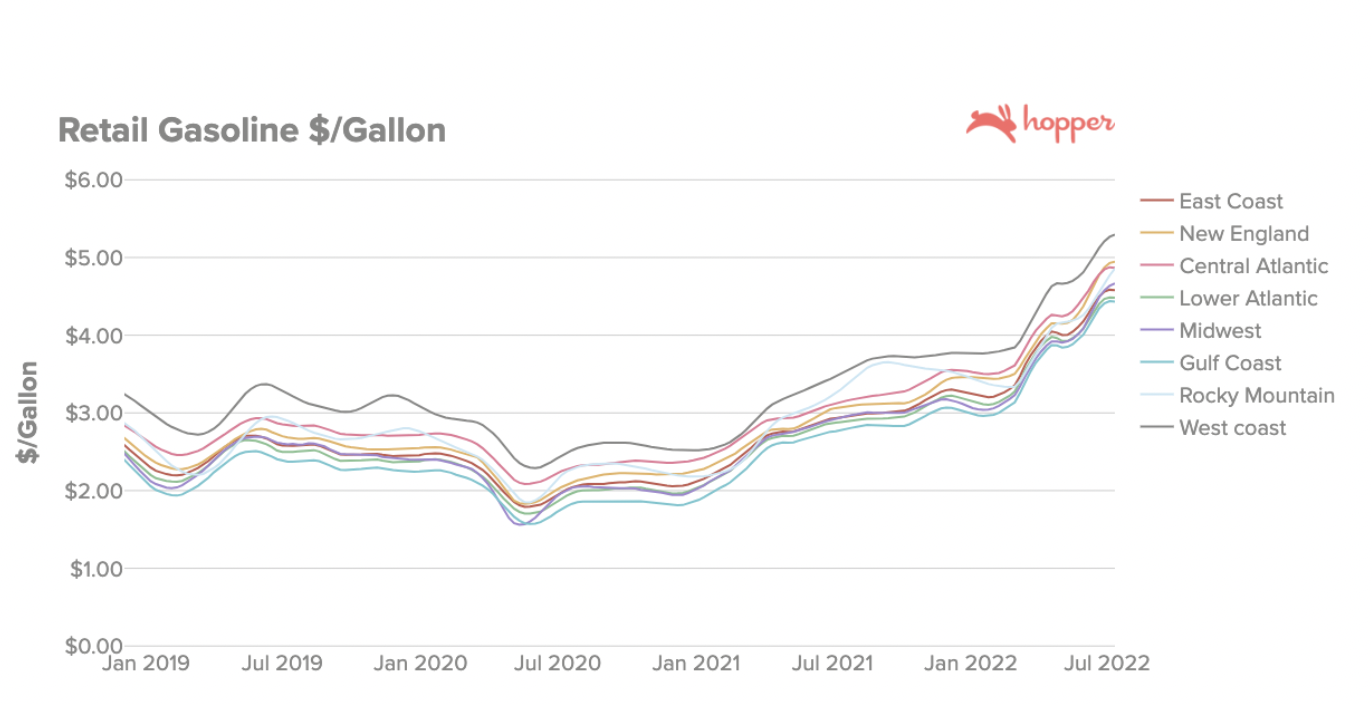
Rental car prices are currently averaging $75/ day in the US, with some major cities like Detroit, Chicago and Newark seeing prices closer to $100 per day. The combined higher cost of gas and demand for rental cars will mean driving this summer may be more expensive than some Americans anticipated.
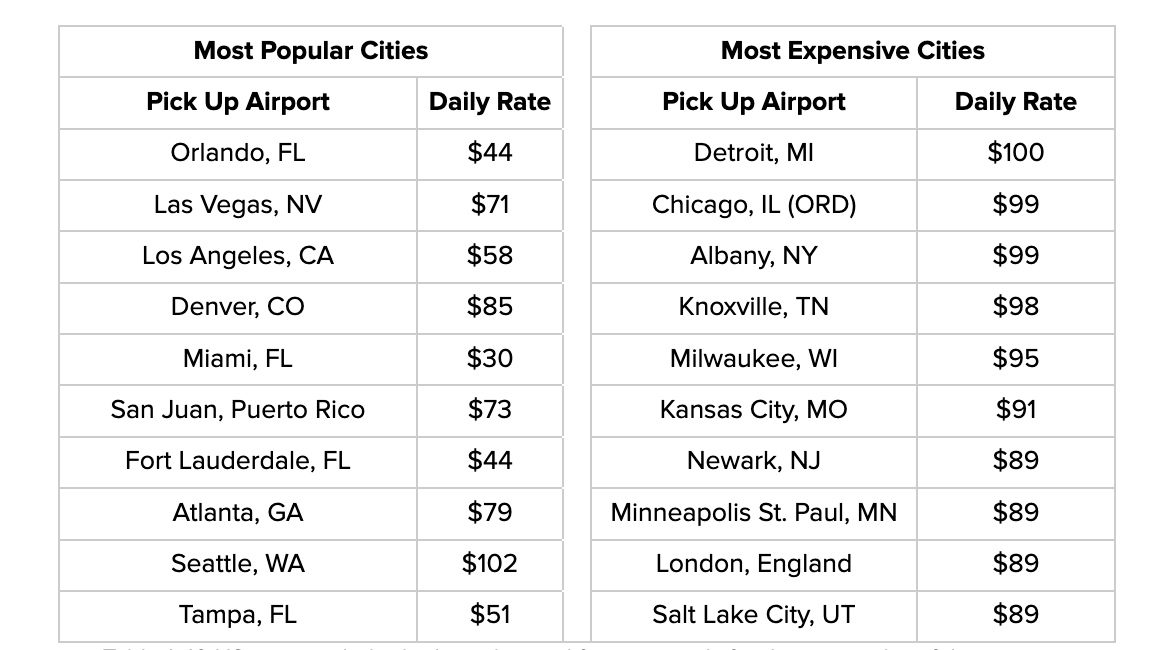
What could a recession mean for travel this year?
This is not the first recession or economic downturn the travel industry has faced, nor will it likely be the last. Even as the industry braces for a potential recession, the impact is expected to be significantly smaller than what the industry experienced over the last two years during the pandemic. In previous recessions the travel industry saw an expenditure decline between 8% and 13% from peak to trough, compared to a 90% drop during the pandemic. This year, travel is expected to continue recovering, with consumers focusing on how to get good deals and save more when booking their travel.
Demand remains strong despite higher prices
Demand for air travel surged from February through a peak in mid June of this year, before beginning to flatten in line with seasonal expectations. In mid summer, demand seasonally falls off and flattens into the fall shoulder season, as most Americans schedule summer vacations and travel between May - July. Demand will pick back up seasonally in September as travelers begin to plan for holiday trips.

5 behaviors that are costing you more on travel
Though consumers plan to reduce their travel expenditure this summer, many consumers are still exhibiting travel planning and booking behaviors which became prevalent during the covid-19 pandemic, behaviors which could cost them more this summer.
1. Starting the planning process too late: Though traveler confidence has improved since the deep lows in 2020, travelers continue to start their travel planning process closer to their departure date than in pre-pandemic years. On average, domestic travelers make their first search for a trip 16% (~1 week) closer to their departure date than in 2018 or 2019, and international travelers make their first search 15% (12 days) closer to their departure date.
Travelers who don’t start the planning and price monitoring process early enough will miss out on low prices and some of the best deals on the market. Hopper users who started tracking prices 90 days before departure saved 31% more on domestic and 29% more on international flights than those who started planning 3 weeks in advance.
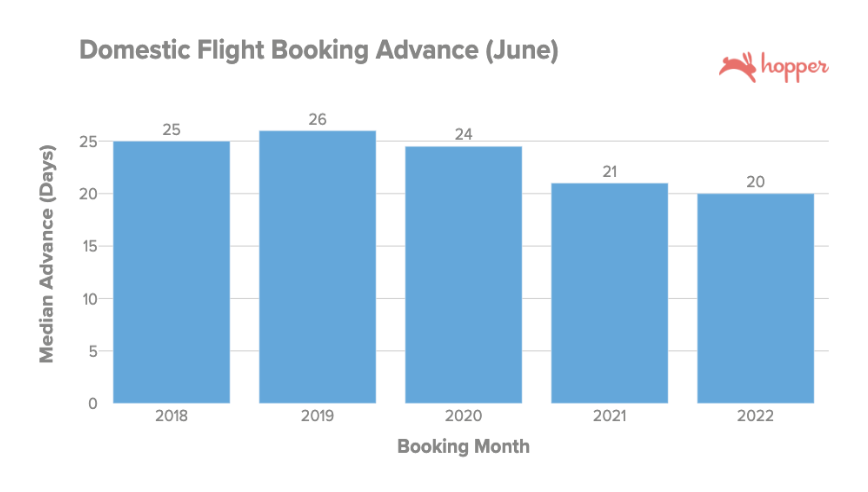
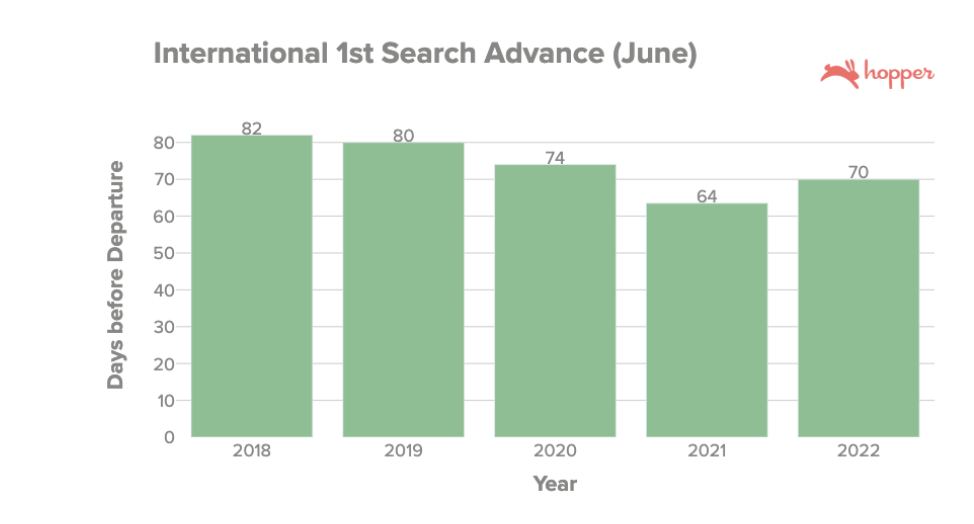
2. Booking flights at the last minute: As the travelers are starting their planning process later, most are also booking flights much closer to their departure than pre-pandemic. On average Americans are booking domestic flights 24% later than in previous years, booking just 3 weeks before departure. International travelers are booking 22% later, about 5 weeks before departure. Airfare will rise on average in the last few weeks before takeoff, increasing as much as 50% in the final 2-3 weeks ahead of departure. Booking at the last minute can mean travelers miss out on lower prices, and sales, that are available weeks and months before departure.
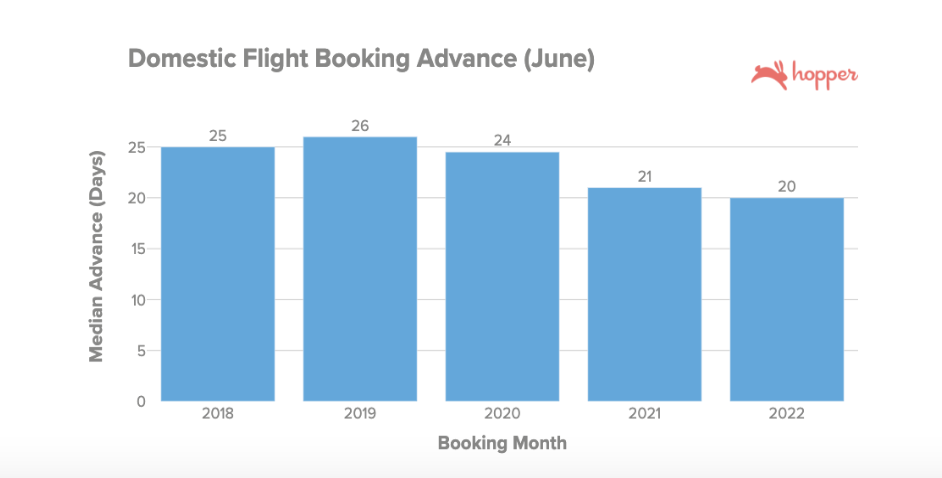
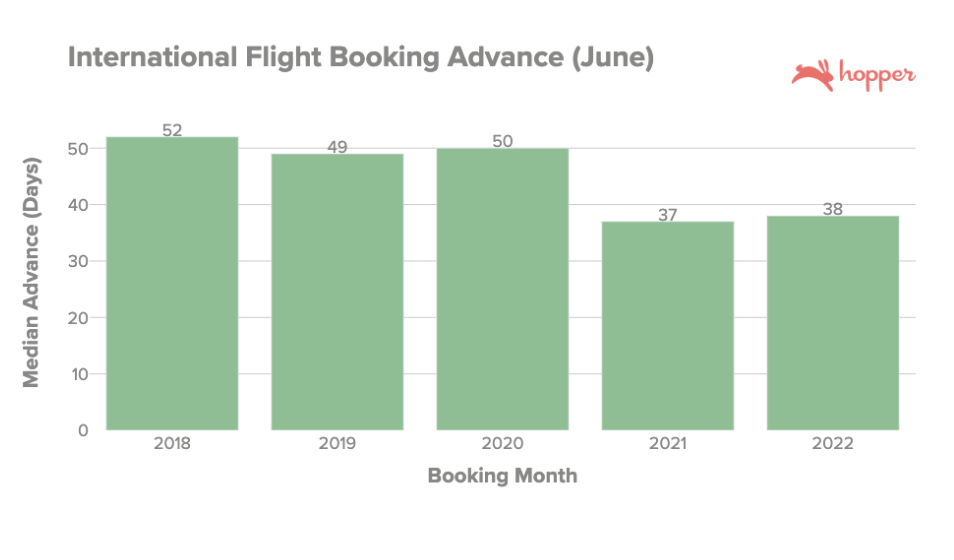
3. Being inflexible: Despite high airfare and packed hotels, there are deals available to travelers who are flexible with their travel dates and destinations.
Travel mid-week: Booking a flight departing on a Tuesday or Wednesday instead of over a peak weekend day can save travelers an average of 10% per domestic ticket. Checking into hotels midweek will also save travelers significantly more than paying peak weekend prices for Friday or Saturday night stays.
Delay vacations too late summer/early fall: For even more flexible travelers, planning vacation for the fall shoulder season (September and October) can save >$100 per ticket on airfare and >$100 on hotel stays.
Consider alternate destinations! For many Americans, domestic flights can cost as much as flights to some international destinations this year. Consider getting more bang for your buck by checking out destinations in the Caribbean, Central America, Canada and Europe that will cost the same, but offer even more exciting experiences. Hotels and resorts more popular in spring and fall, like the Caribbean and Mexico, may even offer special deals to travelers willing to visit in the “off season”!
4. Not preparing for disruption: Demand for flights has recovered with incredible speed this year, but airlines and airports have struggled to keep up with the surging demand and airport traffic. As a result, mass delays, cancellations and hours-long lines at security checkpoints have plagued airports across the globe in recent months. In June, US airports saw a 57% increase in flight cancellations compared to June of 2019. At their peak, as many as 27% of flights in June were delayed, almost half for an hour or more.
For many travelers a major disruption can mean missing an important event or vacation, but even more, it can mean extra hotel nights in a new city or purchasing a new flight out of pocket to get to a destination on time. Hopper has seen a 23% increase in passengers adding Flight Disruption Protection to their bookings. If your trip is delayed or you miss your connection, you can instantly rebook the next flight to their destination in the app – no matter the airline – at no additional cost.
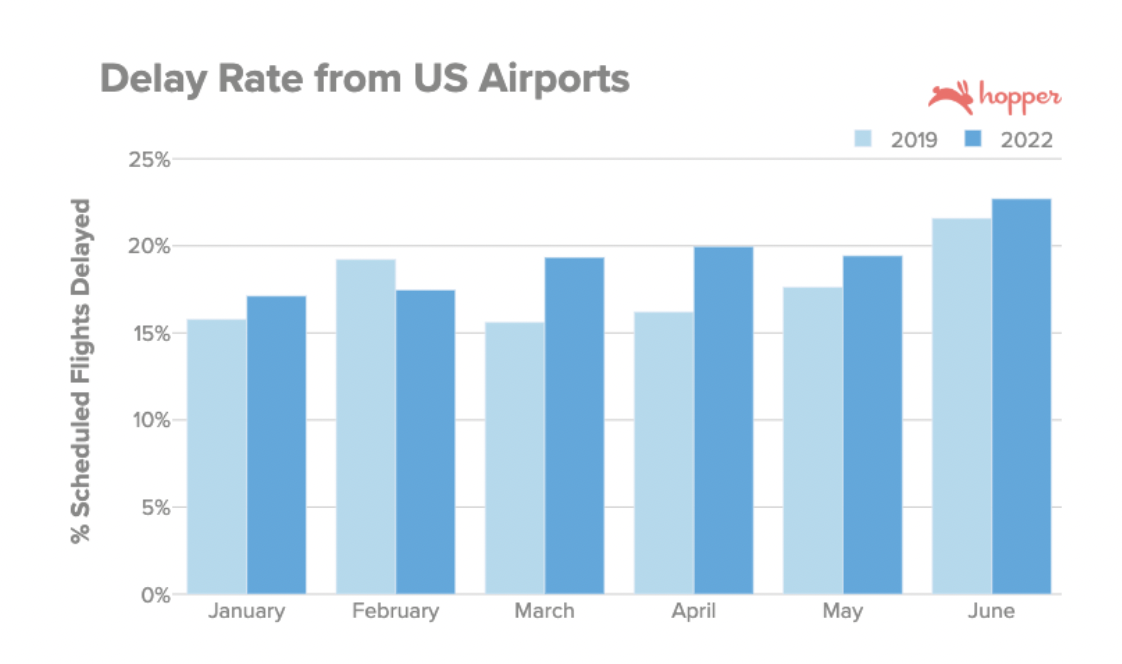
5. Prepaying for gas with your car rental: When you prepay for the gas, you’re paying for the full tank. If you bring it back a quarter full, there’s no refund for the gas you left in the tank. If you don’t use every last drop, you’re paying for gas you didn’t use! With per gallon prices over $5 or $6 in some parts of the country, every dollar counts. Skip the gas prepay and do your homework on where there are gas stations near your drop off location so you can shop for the best price. If you’re dropping off in a different location, gas might even be cheaper where you’re headed!
Methodology: The pricing data utilized for this study comes from Hopper's real-time "shadow traffic" containing the results of consumer airfare searches. Hopper collects, from several Global Distribution System partners, 25 to 30 billion airfare price quotes every day from searches happening all across the web. The prices reflected in this analysis are Hopper’s “good deal price” which represents what a typical leisure traveler should expect to pay, measured using a “tenth percentile.” Delay and cancellation data comes from OAG’s historical flight performance database. Historical recession expenditure changes from Morgan Stanley Research: seasonally adjusted Air, Hotel, Motel personal consumption expenditures BEA.
Get the Hopper app to find the best deals.
You could save up to 40% on your next flight!
